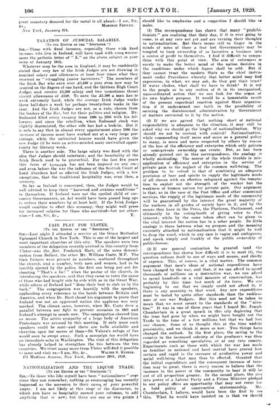TAXATION OF JUDICIAL SALARIES.
[To l'HE EDITOR OF THE " SPEC1ATOR."3 Sne—Thoee with 'Axed incomes, especially those with fixed incomes who live in Ireland, will have read with some amuse- ment the pAthetic letter of " 4." on the above subject in your issue of January 10th.
Whatever may be the ease in England, it may he confidently stated that very few of the Irish Judges are pot drawing in nominal salary and allowances at least four times what they received as "struggling junior barrieters." The members of the Irish Bar who earn over 41,600 a year even now may be counted on the fingers-of-one hand, and the thirteen High Court Judges each receive £3,600 salary and two (sometimes three) circuit allowances of 4160. To earn the 41,500 a man has to work extremely hard, while the average Irish Judge works three half-days a week for perhaps twenty-four weeks in the year. And the Irish Judges are not, as a rule, chosen from the leaders of the Bar, but for their politics and religion. Mr. Redmond filled every vacancy from 1906 to 1916 with his fol- lowers; and since the rebellion, when Redmond stock was slightly depreciated, the other side has had a look-in. But it is safe to say that in almost every appointment since 1906 the increase of income must have worked out at a very large per- centage, while the unlimited leisure would have given the new Judge (if he were an active-minded man) unrivalled oppor- tunity for literary work.
There is another aide. The large salary was fixed with the idea that Judges should entertain; and the hospitality of the Irish Bench used to be proverbial. For the lust five years this form of Aetrovnla has not been imposed on any one; and even before the war the influence of the Scottish Court of Lord Aberdeen had so affected the Irish Judges, with a few exceptions, that •the traditional hospitality was, even then, a memory.
So far as Ireland is concerned, then, the Judges would be well advised to keep their "harassed and anxious conditions" to themselves. If Ireland were not the spoiled child of suc- cessive Governments, an Act would have been passed long ago to reduce their numbers by at least half. If the Irish Judges would combine to effect this economy, they might well press for increased salaries for those who survived—but not other-


































 Previous page
Previous page